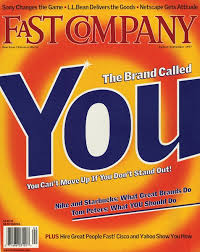 In the days before all the self-promotion brand me and brand you gurus marketers were far more curious; and new products frequently topped half a billion in sales in their first year. Then came the rise of brand me and brand you; brought to you by all the self-promotion gurus who made killings while the companies in which all the mes and yous worked saw declines in new business. As McKinsey reports, CPG execs [still] wonder where new growth will come from. The rise of the MEs was about the time everyone at companies like General Motors replaced the title on their business card with a new title that read, "Knower of all things." Hence systems were devised in companies like General Motors that deflected all responsibility away from individuals. You couldn't put your thumb on anyone for being responsible for anything. Thus began the commoditization of syndicated knowledge. Let's hire the people who tell us the things we already know rather than the people who can tell us things we don't know. What I already know is just easier to manage. We're doing fine. Hell, even at the end General Motors still owned 20% of the market. Hell, nothing to worry about here. Even in failure we have a way to convince ourselves, the brand MEs that GM's stunning failure is a success. The bar for excellence has dropped so low we can go to the head of the class just by showing up...or keeping some dealerships open. Forget Bruce Almighty. It's GM Almighty. Failure is the new black. And that's what the rise of brand ME or Brand You has brought us. Anyway, with the rise of brand me and the decline in outward looking forward thinking the impact of new products began to dwindle. Hell, they've damn faded, and the guys running the companies are being conned by a new nemesis called social marketing. Now we're touting the success of new products brought to us by a new messenger: social media. Companies like P&G and Del Monte Pet Products have new products generated by social media. The "community" created it. I took no risks. Yet none of the growth topped $100 million and not one social media product will top this year's or next year's top 10 most successful new products. Guaranteed. In 2008 the most successful new product anyone launched was Gatorade G2 at $159 million. The least successful new product I've ever conceived working with those pre-ME curious execs was Baked Lays. It sold $310 million in its first 10 months. I'm fairely safe in my contention that Del Monte's Breakfast Snacks for Pets will not move the needle past $60 million. But that won't stop others from following suit. Just no original thinking left in those MEs and YOUs. That's the greatest risk to new products. Now I'm not pooh, poohing new channels for product development but without doping people's thoughts with creativity before they create something you're just not going to get that $400+ million winner that comes from creating new knowledge that's never previously existed to be perceived, mapped or measured.
In the days before all the self-promotion brand me and brand you gurus marketers were far more curious; and new products frequently topped half a billion in sales in their first year. Then came the rise of brand me and brand you; brought to you by all the self-promotion gurus who made killings while the companies in which all the mes and yous worked saw declines in new business. As McKinsey reports, CPG execs [still] wonder where new growth will come from. The rise of the MEs was about the time everyone at companies like General Motors replaced the title on their business card with a new title that read, "Knower of all things." Hence systems were devised in companies like General Motors that deflected all responsibility away from individuals. You couldn't put your thumb on anyone for being responsible for anything. Thus began the commoditization of syndicated knowledge. Let's hire the people who tell us the things we already know rather than the people who can tell us things we don't know. What I already know is just easier to manage. We're doing fine. Hell, even at the end General Motors still owned 20% of the market. Hell, nothing to worry about here. Even in failure we have a way to convince ourselves, the brand MEs that GM's stunning failure is a success. The bar for excellence has dropped so low we can go to the head of the class just by showing up...or keeping some dealerships open. Forget Bruce Almighty. It's GM Almighty. Failure is the new black. And that's what the rise of brand ME or Brand You has brought us. Anyway, with the rise of brand me and the decline in outward looking forward thinking the impact of new products began to dwindle. Hell, they've damn faded, and the guys running the companies are being conned by a new nemesis called social marketing. Now we're touting the success of new products brought to us by a new messenger: social media. Companies like P&G and Del Monte Pet Products have new products generated by social media. The "community" created it. I took no risks. Yet none of the growth topped $100 million and not one social media product will top this year's or next year's top 10 most successful new products. Guaranteed. In 2008 the most successful new product anyone launched was Gatorade G2 at $159 million. The least successful new product I've ever conceived working with those pre-ME curious execs was Baked Lays. It sold $310 million in its first 10 months. I'm fairely safe in my contention that Del Monte's Breakfast Snacks for Pets will not move the needle past $60 million. But that won't stop others from following suit. Just no original thinking left in those MEs and YOUs. That's the greatest risk to new products. Now I'm not pooh, poohing new channels for product development but without doping people's thoughts with creativity before they create something you're just not going to get that $400+ million winner that comes from creating new knowledge that's never previously existed to be perceived, mapped or measured.

Tuesday, May 26, 2009
Brand Me, Brand You and the Decline of New Products
 In the days before all the self-promotion brand me and brand you gurus marketers were far more curious; and new products frequently topped half a billion in sales in their first year. Then came the rise of brand me and brand you; brought to you by all the self-promotion gurus who made killings while the companies in which all the mes and yous worked saw declines in new business. As McKinsey reports, CPG execs [still] wonder where new growth will come from. The rise of the MEs was about the time everyone at companies like General Motors replaced the title on their business card with a new title that read, "Knower of all things." Hence systems were devised in companies like General Motors that deflected all responsibility away from individuals. You couldn't put your thumb on anyone for being responsible for anything. Thus began the commoditization of syndicated knowledge. Let's hire the people who tell us the things we already know rather than the people who can tell us things we don't know. What I already know is just easier to manage. We're doing fine. Hell, even at the end General Motors still owned 20% of the market. Hell, nothing to worry about here. Even in failure we have a way to convince ourselves, the brand MEs that GM's stunning failure is a success. The bar for excellence has dropped so low we can go to the head of the class just by showing up...or keeping some dealerships open. Forget Bruce Almighty. It's GM Almighty. Failure is the new black. And that's what the rise of brand ME or Brand You has brought us. Anyway, with the rise of brand me and the decline in outward looking forward thinking the impact of new products began to dwindle. Hell, they've damn faded, and the guys running the companies are being conned by a new nemesis called social marketing. Now we're touting the success of new products brought to us by a new messenger: social media. Companies like P&G and Del Monte Pet Products have new products generated by social media. The "community" created it. I took no risks. Yet none of the growth topped $100 million and not one social media product will top this year's or next year's top 10 most successful new products. Guaranteed. In 2008 the most successful new product anyone launched was Gatorade G2 at $159 million. The least successful new product I've ever conceived working with those pre-ME curious execs was Baked Lays. It sold $310 million in its first 10 months. I'm fairely safe in my contention that Del Monte's Breakfast Snacks for Pets will not move the needle past $60 million. But that won't stop others from following suit. Just no original thinking left in those MEs and YOUs. That's the greatest risk to new products. Now I'm not pooh, poohing new channels for product development but without doping people's thoughts with creativity before they create something you're just not going to get that $400+ million winner that comes from creating new knowledge that's never previously existed to be perceived, mapped or measured.
In the days before all the self-promotion brand me and brand you gurus marketers were far more curious; and new products frequently topped half a billion in sales in their first year. Then came the rise of brand me and brand you; brought to you by all the self-promotion gurus who made killings while the companies in which all the mes and yous worked saw declines in new business. As McKinsey reports, CPG execs [still] wonder where new growth will come from. The rise of the MEs was about the time everyone at companies like General Motors replaced the title on their business card with a new title that read, "Knower of all things." Hence systems were devised in companies like General Motors that deflected all responsibility away from individuals. You couldn't put your thumb on anyone for being responsible for anything. Thus began the commoditization of syndicated knowledge. Let's hire the people who tell us the things we already know rather than the people who can tell us things we don't know. What I already know is just easier to manage. We're doing fine. Hell, even at the end General Motors still owned 20% of the market. Hell, nothing to worry about here. Even in failure we have a way to convince ourselves, the brand MEs that GM's stunning failure is a success. The bar for excellence has dropped so low we can go to the head of the class just by showing up...or keeping some dealerships open. Forget Bruce Almighty. It's GM Almighty. Failure is the new black. And that's what the rise of brand ME or Brand You has brought us. Anyway, with the rise of brand me and the decline in outward looking forward thinking the impact of new products began to dwindle. Hell, they've damn faded, and the guys running the companies are being conned by a new nemesis called social marketing. Now we're touting the success of new products brought to us by a new messenger: social media. Companies like P&G and Del Monte Pet Products have new products generated by social media. The "community" created it. I took no risks. Yet none of the growth topped $100 million and not one social media product will top this year's or next year's top 10 most successful new products. Guaranteed. In 2008 the most successful new product anyone launched was Gatorade G2 at $159 million. The least successful new product I've ever conceived working with those pre-ME curious execs was Baked Lays. It sold $310 million in its first 10 months. I'm fairely safe in my contention that Del Monte's Breakfast Snacks for Pets will not move the needle past $60 million. But that won't stop others from following suit. Just no original thinking left in those MEs and YOUs. That's the greatest risk to new products. Now I'm not pooh, poohing new channels for product development but without doping people's thoughts with creativity before they create something you're just not going to get that $400+ million winner that comes from creating new knowledge that's never previously existed to be perceived, mapped or measured.
Thursday, May 14, 2009
Calle & Company New Products Top IRI, NPD & ACNielsen 2008 Most Successful New Product Pacesetters for 56th Year
 I've said it before. My name is Martin Callé. I run Callé & Company, the most successful new products development company in the consumer packaged goods industry. Once again, our new products topped the best of IRI, NPD and ACNielsen’s most successful new product pacesetters for the 56th year. The least successful new product we ever conceived, Frito-Lay’s Baked Lays Potato Chips sold $310 million in its first 10 months. 2008’s most successful new product, Gatorade’s G2 sold only $159 million in its first year. So if our least successful new product beat their most successful new product conceived some other way, doesn’t that tell you that their best practices aren’t the best practices?
I've said it before. My name is Martin Callé. I run Callé & Company, the most successful new products development company in the consumer packaged goods industry. Once again, our new products topped the best of IRI, NPD and ACNielsen’s most successful new product pacesetters for the 56th year. The least successful new product we ever conceived, Frito-Lay’s Baked Lays Potato Chips sold $310 million in its first 10 months. 2008’s most successful new product, Gatorade’s G2 sold only $159 million in its first year. So if our least successful new product beat their most successful new product conceived some other way, doesn’t that tell you that their best practices aren’t the best practices?Data from market research companies like IRI, NPD and ACNielsen typically drive new product development in companies such as yours. And no one using that knowledge has been able to launch a more successful new product than ours in 56 years. In fact, ACNielsen has not launched a more successful new product since their founding in 1923. NPD has not launched a more successful new product since their founding in 1967. And IRI has not launched a more successful product since their founding in 1979.
We know companies want a better grip on consumer behavior than NPD provides. We know companies want new products to fly off the shelf faster than those piloted by IRI. We know you want to own and sustain a #1 position for ACNielsen to track. But IRI, NPD and ACNielsen data won’t take you there alone. For example, IRI, NPD and ACNielsen all thought Crock Pot Classics was a great opportunity for ConAgra. Slow-cooking was on the rise. More than 80 percent of US households owned slow cookers and 20 percent of families used slow cookers weekly. Yet Crock Pot Classics ended 2005 10th among 10 at only $71 million - well below Calle & Company’s average best in packaged goods benchmarks.
Higher functioning Calle & Company new products are ever present, yet never twice the same. They're creatively built upon consumer-conceived new knowledge that’s never existed to be mapped or measured. IRI, NPD and ACNielsen can’t do that. So when I say, “Callé & Company is the most successful new product development company in the consumer packaged goods industry,” I mean it. It’s true. So grab yourself one of our better performers. Let’s meet to discuss what everyone else is missing. Got 30 minutes? Let’s talk!
Subscribe to:
Posts (Atom)









